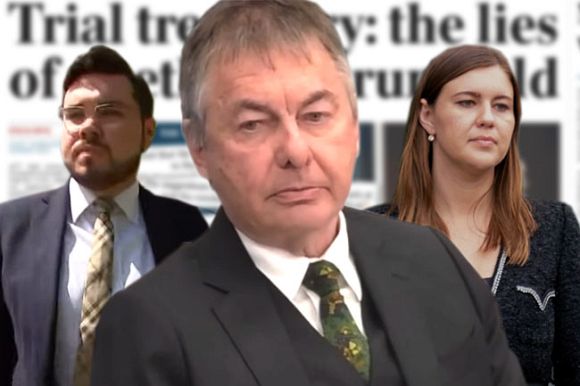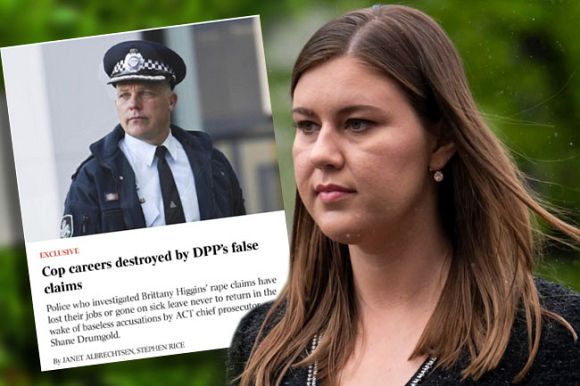The Sofronoff Inquiry's failure to address the juror who caused the Lehrmann rape trial to be aborted raises questions about the A.C.T. legal system, writes Paul Begley.
*CONTENT WARNING: This article discusses rape
*Also listen to the audio version of this article on Spotify HERE.
DURING THE Sofronoff Inquiry into the A.C.T. criminal justice system, the Director of Public Prosecutions, Shane Drumgold SC, told the Inquiry that he routinely makes private assessments of how he thinks jurors are travelling in terms of arriving at a verdict on the evidence they are hearing.
Without making claims for his success rate in assessing jurors on their body language, he ventured the view that 11 of the 12 jurors in the Lehrmann rape trial appeared to lean towards the prosecution case, adding that the one who didn’t, ended up being the juror whose misconduct caused the trial to be aborted.
To Sofronoff’s question as to why he did that, Drumgold gave what seems an obvious answer: “Because I’m a lawyer.”
After Sofronoff’s report had been prematurely released to a partisan journalist before being handed to the government that commissioned it, Drumgold observed that his disappointments about the Inquiry included the fact that it had not looked at why the A.C.T. justice system had over recent years increasingly undercharged in rape cases.
Sofronoff refused to allow the Inquiry to head down a path that looked at the data relating to undercharging, despite acknowledging that the term did not refer to police reducing the severity of charges in rape cases but rather referred to police not proceeding with rape charges at all.
As the Inquiry progressed, it became clear that there were significant misunderstandings about the role of police in deciding on the threshold for pressing charges in rape cases, with some police wrongly believing the threshold was reasonable prospects of conviction, a prerogative not of the police but the DPP.
Those misunderstandings had contributed to Drumgold believing there had been a police conspiracy to not charge Lehrmann with rape, a view he amended when he realised a police “skill deficit” was the root cause. In the event, Lehrmann was charged with rape, a decision that Sofronoff found to be correct, despite his jaundiced report on Drumgold’s singular role in pursuing charges under pressure not to.
Despite that, in Drumgold’s view, a variety of abnormalities presented themselves at the trial. They included the police seeming to side with the defence team and untoward interference in the proceedings by Senator Linda Reynolds, who was cautioned for appearing to coach the defence team.
On top of those apparent abnormalities was a rogue juror.
When the jury had been in deliberation for four days without coming to a unanimous verdict, the judge inquired whether there was a problem. The foreman said they were on the verge of a verdict but were not quite there. Early on the fifth day, the offending juror left their papers sitting on a table, the discovery of which revealed their misconduct and the trial was summarily aborted.
Had the trial been held in Victoria, Western Australia, South Australia, Tasmania or the Northern Territory, the presiding judge would have had the discretion at that point to have decided to allow a majority verdict of 11 jurors to stand. But the A.C.T. legal system does not allow for that discretion to be exercised, leaving the judge no option other than to abort the trial.
Curiously, on a matter so central to an expensive exercise that has caused trauma in numerous quarters with high political stakes, the Sofronoff Inquiry did not consider the matter of the rogue juror, nor did it look in general at the jury system as it applies in the A.C.T. with respect to unanimity in arriving at verdicts.
In announcing the Sofronoff Board of Inquiry, the A.C.T. Government set out the relevant information about the Inquiries Act in relation to the powers Sofronoff was free to exercise.
They included the following:
The Inquiries Act 1991 allows a Board of Inquiry to do all things necessary to make and complete the Inquiry. This includes powers to:
- require a person to appear before the board at a hearing to give evidence (section 26(1)(a))
These powers override any other legislative provisions or confidentiality agreements.
Although he possessed that and other powers, Sofronoff did not explore jury issues during the Inquiry, despite it having become apparent that the legal system in the A.C.T. disallows judicial discretion on majority jury verdicts and that juror misconduct is neither accountable nor punishable.
Drumgold, the police and the Victims of Crime Commissioner, Heidi Yates, were asked to explain themselves in depth and at length, but the offending 12th juror simply walked away with no questions asked.
In a comparable case in Queensland, after a trial of the corrupt Premier Joh Bjelke-Petersen was aborted, the rogue jury foreman was outed as a Joh enthusiast whose partisan status should have disallowed him from sitting on the jury, much less becoming its foreman.
When citizens are selected to participate in the jury system, they are described as doing “jury duty”. In other words, they are not simply doing a favour out of the goodness of their hearts; they are performing a public duty, just as citizens do when paying taxation on their income.
Engaging in misconduct when paying tax can result in criminal charges and severe penalties. If juror misconduct is both unaccountable and unpunishable, what is to stop a juror from accepting a substantial bribe to engage in conduct that causes a mistrial?
Without suggesting the juror in the Lehrmann rape trial was nobbled, when the stakes are high and the risk of being found out is low, the opportunity for intervention of bad actors presents itself and is an obvious point of inquiry that Sofronoff was free to pursue, if only to rule it out.
As it now stands, the question can be asked but there appears no way to get anything like a satisfactory answer on a critical question that continues to be a running sore with little prospect of healing.
If you would like to speak to someone about sexual violence, please call the 1800 Respect hotline on 1800 737 732 or chat online, Lifeline on 13 11 14 or the Suicide Call Back Service on 1300 659 467.
*This article is also available on audio here:
Paul Begley has worked for many years in public affairs roles, until recently as General Manager of Government and Media Relations with the Australian HR Institute. You can follow Paul on Twitter @yelgeb.
 This work is licensed under a Creative Commons Attribution-NonCommercial-NoDerivs 3.0 Australia License
This work is licensed under a Creative Commons Attribution-NonCommercial-NoDerivs 3.0 Australia License
Support independent journalism Subscribe to IA.















